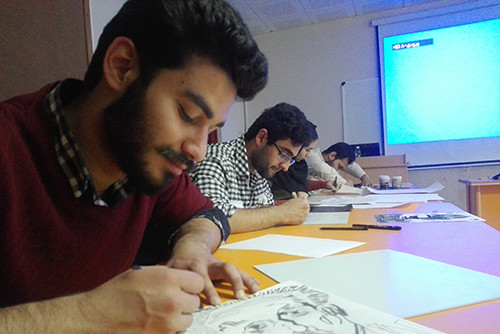
T (+98) 23 3117 0000
Email: info@du.ac.ir
دانشگاه دامغان
دامغان، میدان دانشگاه، دانشگاه دامغان، کد پستی 3671645667
About School
School of Arts The School of Arts at Damghan University was instituted in February 2011, admitting undergraduate students in the two majors of Dramatic Literature, and Television and Digital Arts. In September 2011, the major of Cinema was also introduced to the school at the undergraduate level. Currently, the School of Arts has 10 faculty members and nearly 300 students, and the Scholarly Association for Television and Digital Arts and the Scholarly Association for Dramatic Literature are two important environments for student learning and development in this school. With the help from the school’s students and faculty members, these associations hold the “Hecatom” and “Ordibehesht Theater” festivals every year, inviting students from all over the country to take part in these festivals. The School of Arts at Damghan University is equipped with three theater workshops, a photo lab, a design workshop, a studio, a graphics workshop, and an animation and digital graphics workroom. In recent years, the students of the school have won several awards, such as the Akbar Radi Prize for the Best Drama from the 22nd Iran International University Theater Festival.

Students of dramatic literature are deep and insightful readers of literature and fine arts. They explore emotional and social issues and use their pens to advance them. Talent and interest are the prerequisites for this major, but perseverance and success in the field needs reading, thinking, and writing. As such, those who do not have a deep, sincere, and honest friendship with books are not recommended to enter this field.
After graduation, students of dramatic literature can pursue job opportunities in several directions, such as writing dramas and plays or developing projects for theater, radio, television and cinema. Journalism and arts criticism, research and education are other careers in which the graduates of dramatic literature can become successful.
The Department of Dramatic Literature at Damghan University was instituted in 2011, and since then, experienced instructors and artists have been teaching in the department. In addition to classrooms, the School of Arts at Damghan University has four well-equipped workshops for theater performance, theater rehearsal and television recording. The school’s open air amphitheater is also a suitable place for outdoor theater, and students can use this space for rehearsal and performance.

The major of Television and Digital Arts, also offered at the Iran Broadcasting University (IRIB), deals with communication methods in today's digital world. The major was instituted at Damghan University with the purpose of training undergraduate students who are interested in the production and development of television, computer and digital programs. By attending theoretical and practical courses on "Computer Graphics" and "Computer Animation", the candidates develop the skills and abilities needed in the areas of design, graphics software, animation, language and structure of television, and the production of digital arts.
The job market for this academic major is somehow assured, since the majority of people in the world appreciate the electronic and virtual media. That said, the graduates may have the opportunity to work in either commercial fields, such as advertising, or in artistic fields such as film production or cinema education.

Cinema, which includes such genres as feature films, documentaries, short films, etc., is a twentieth-century human innovation. Cinema records movement in space and time, which is representative of one’s struggle with death.
The main objective of the major is to train the cinephiles, who revere and even worship cinema as a way of life, in the areas of screenwriting, directing, editing, and filmmaking. In addition to watching films and reading books on cinema, this major requires that students do research in various fields, such as sociology, psychology, culture, literature, and drama because cinema is related to all the aspects of individual and collective human life. Cinema, as an art also most related to technology and scientific advances, modifies many of its principles and techniques as a response to scientific upheavals. It portrays life and the world and criticizes them at the same time; sometimes it is funny and sometimes thought-provoking. Studying in this major helps students not only learn the principles, methods and techniques of cinematics, but also know themselves and the society around them more deeply.

